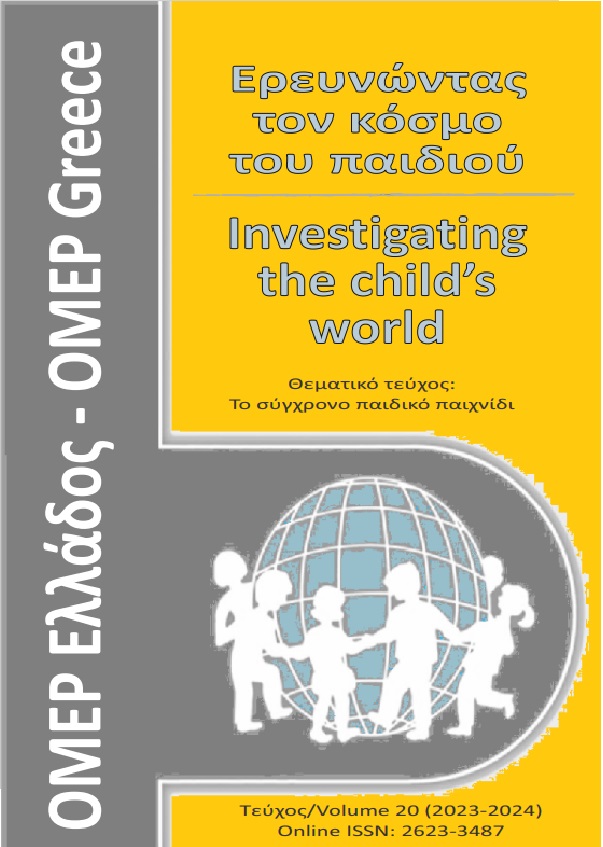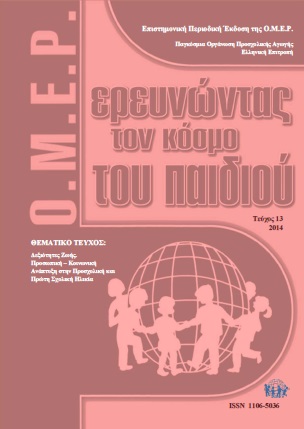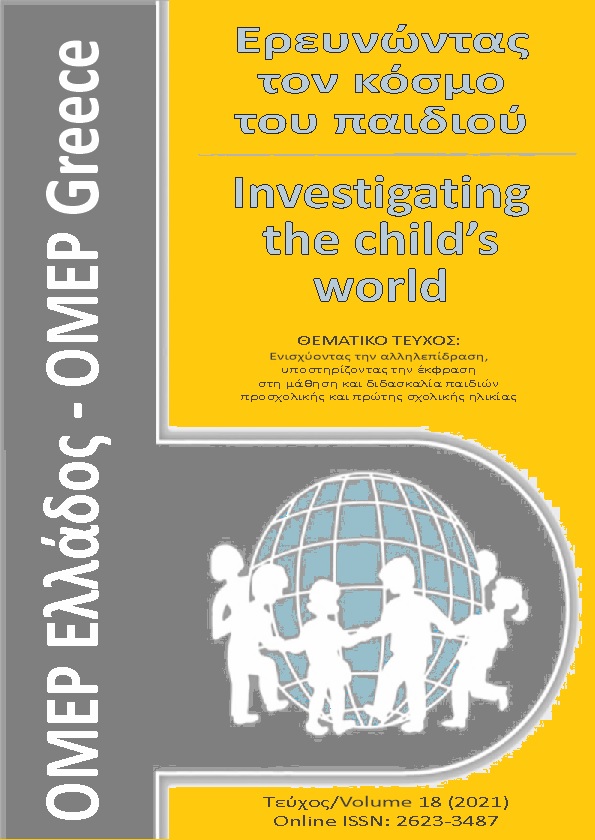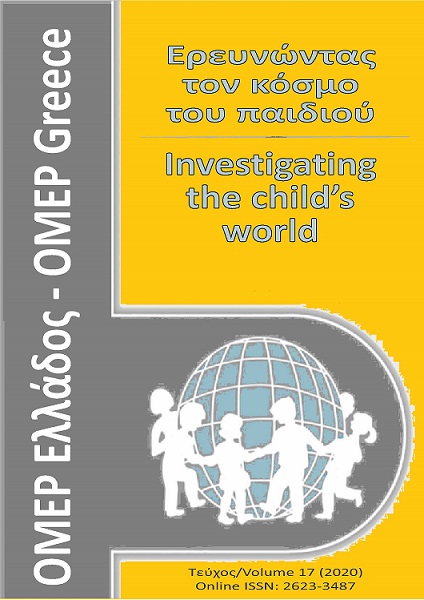Ανιχνεύοντας τις αλλαγές που συμβαίνουν στο σύγχρονο παιχνίδι. Εισαγωγικό Σημείωμα
Resumen
Η παγκόσμια και πολυδιάστατη έκρηξη ενασχόλησης με το παιδικό παιχνίδι που παρατηρείται σήμερα σε ερευνητικό, θεσμικό και πρακτικό επίπεδο είναι πολύ ενθαρρυντική και καθοδηγείται σε μεγάλο βαθμό από την προσπάθεια υπεράσπισης του δικαιώματος των παιδιών στο παιχνίδι. Ωστόσο, σήμερα πληθαίνουν οι φωνές ανησυχίας που μας προειδοποιούν για τις σοβαρές απειλές που δέχεται το παιδικό παιχνίδι. Σε αυτό το άρθρο, που αποτελεί το εισαγωγικό σημείωμα του θεματικού τεύχους «Το σύγχρονο παιδικό παιχνίδι» του περιοδικού «Ερευνώντας τον Κόσμο του Παιδιού», συζητούνται σημεία αιχμής που φαίνεται να δρουν καταλυτικά στην μείωση των ευκαιριών για παιχνίδι, όπως η αστικοποίηση της σύγχρονης ζωής και οι αφιλόξενες σύγχρονες πόλεις, οι επαναλαμβανόμενες κρίσεις, η ανταγωνιστική κοινωνία και η αντίστοιχη επιτάχυνση της παιδικής ηλικίας, η μη ορατότητα των παιδιών και των αναγκών τους, η έλλειψη πολιτικών για την προάσπιση του παιχνιδιού και η ανεπαρκής κατανόηση του παιχνιδιού των παιδιών μέσα από τα δικά τους μάτια. Παράλληλα ωστόσο, διακρίνονται και νέα παραδείγματα μέσα από σύγχρονες μελέτες ερευνητών που παίρνουν σοβαρά το παιδικό παιχνίδι. Έτσι, διαπιστώνεται ότι τα παιδιά βρίσκουν τρόπους να αντιδρούν στους περιορισμούς και να επαναπροσδιορίζουν το παιχνίδι τους, παρακολουθώντας τις αλλαγές του κόσμου και τα μέσα που τους προσφέρονται σε συνεχή αλληλεπίδραση με τους άλλους. Η συζήτηση που αναπτύσσεται καταλήγει ότι το παιχνίδι των παιδιών καθώς μετασχηματίζεται συνεχώς παραμένει άπιαστο και σίγουρα δεν ερμηνεύεται με μονοδιάστατες οπτικές ή παραδοσιακές πεποιθήσεις ούτε με απλοϊκές παραδοχές και εύκολους αφορισμούς [...]
Article Details
- Cómo citar
-
Παπανδρέου Μ. (2024). Ανιχνεύοντας τις αλλαγές που συμβαίνουν στο σύγχρονο παιχνίδι. Εισαγωγικό Σημείωμα. Ερευνώντας τον κόσμο του παιδιού, 20, 5–20. https://doi.org/10.12681/icw.40329
- Sección
- Επιστημονική αρθρογραφία & εκπαιδευτικές δράσεις

Esta obra está bajo una licencia internacional Creative Commons Atribución-NoComercial 4.0.
Οι Συγγραφείς που δημοσιεύουν εργασίες τους σε αυτό το περιοδικό συμφωνούν στους παρακάτω όρους:
Οι Συγγραφείς διατηρούν τα Πνευματικά Δικαιώματα και χορηγούν στο περιοδικό το δικαίωμα της πρώτης δημοσίευσης ενώ ταυτόχρονα τα πνευματικά δικαιώματα της εργασίας προστατεύονται σύμφωνα με την Creative Commons Attribution License που επιτρέπει σε τρίτους - αποδέκτες της άδειας να χρησιμοποιούν την εργασία όπως θέλουν με την προϋπόθεση της διατήρησης των διατυπώσεων που προβλέπονται στην άδεια σχετικά με την αναφορά στον αρχικό δημιουργό και την αρχική δημοσίευση σε αυτό το περιοδικό.
Οι Συγγραφείς μπορούν να συνάπτουν ξεχωριστές, και πρόσθετες συμβάσεις και συμφωνίες για την μη αποκλειστική διανομή της εργασίας όπως δημοσιεύτηκε στο περιοδικό αυτό (π.χ. κατάθεση σε ένα ακαδημαϊκό καταθετήριο ή δημοσίευση σε ένα βιβλίο), με την προϋπόθεση της αναγνώρισης και την αναφοράς της πρώτης δημοσίευσης σε αυτό το περιοδικό.
Το περιοδικό επιτρέπει και ενθαρρύνει τους Συγγραφείς να καταθέτουν τις εργασίες τους μέσω διαδικτύου (π.χ. σε ένα ακαδημαϊκό καταθετήριο ή στους προσωπικές τους ιστοσελίδες) πριν και μετά από τις διαδικασίες της δημοσίευσης, καθώς αυτό μπορεί να οδηγήσει σε παραγωγική ανταλλαγή ιδεών και σκέψεων καθώς επίσης και σε γρηγορότερη και μεγαλύτερη χρήση και ευρετηρίαση της δημοσιευμένης εργασίας (See The Effect of Open Access).






